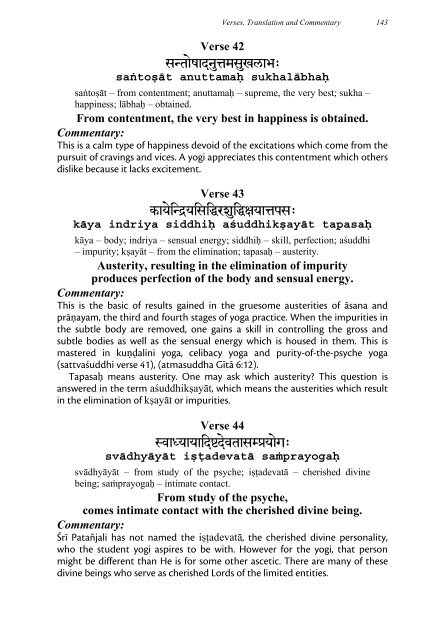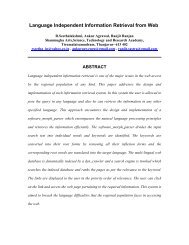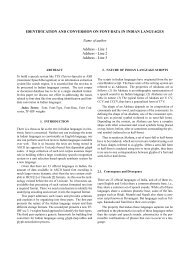Create successful ePaper yourself
Turn your PDF publications into a flip-book with our unique Google optimized e-Paper software.
Verses, Translation and Commentary 143<br />
Verse 42<br />
sNtae;adnuÄmsuola-><br />
saṅtoṣāt anuttamaḥ sukhalābhaḥ<br />
saṅtoṣāt – from contentment; anuttamaḥ – supreme, the very best; sukha –<br />
happiness; lābhaḥ – obtained.<br />
From contentment, the very best in happiness is obtained.<br />
Commentary:<br />
This is a calm type of happiness devoid of the excitations which come from the<br />
pursuit of cravings and vices. A yogi appreciates this contentment which others<br />
dislike because it lacks excitement.<br />
Verse 43<br />
kayeiNÔyisiÏrzuiÏ]yaÄps><br />
kāya indriya siddhiḥ aśuddhikṣayāt tapasaḥ<br />
kāya – body; indriya – sensual energy; siddhiḥ – skill, perfection; aśuddhi<br />
– impurity; kṣayāt – from the elimination; tapasaḥ – austerity.<br />
Austerity, resulting in the elimination of impurity<br />
produces perfection of the body and sensual energy.<br />
Commentary:<br />
This is the basic of results gained in the gruesome austerities of āsana and<br />
prāṇayam, the third and fourth stages of yoga practice. When the impurities in<br />
the subtle body are removed, one gains a skill in controlling the gross and<br />
subtle bodies as well as the sensual energy which is housed in them. This is<br />
mastered in kuṇḍalini yoga, celibacy yoga and purity-of-the-psyche yoga<br />
(sattvaśuddhi verse 41), (atmasuddha Gītā 6:12).<br />
Tapasaḥ means austerity. One may ask which austerity? This question is<br />
answered in the term aśuddhikṣayāt, which means the austerities which result<br />
in the elimination of kṣayāt or impurities.<br />
Verse 44<br />
SvaXyayaidòdevtasMàyaeg><br />
svādhyāyāt iṣṭadevatā saṁprayogaḥ<br />
svādhyāyāt – from study of the psyche; iṣṭadevatā – cherished divine<br />
being; saṁprayogaḥ – intimate contact.<br />
From study of the psyche,<br />
comes intimate contact with the cherished divine being.<br />
Commentary:<br />
Śrī Patañjali has not named the iṣṭadevatā, the cherished divine personality,<br />
who the student yogi aspires to be with. However for the yogi, that person<br />
might be different than He is for some other ascetic. There are many of these<br />
divine beings who serve as cherished Lords of the limited entities.










